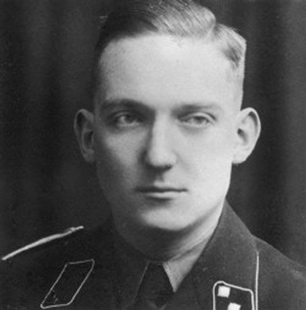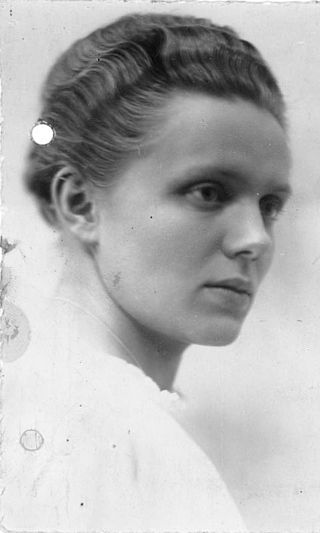See also
- Operation Himmler (less often known as: Operation Konserve, Operation Canned Goods), a Nazi Germany false flag project
Himmler is a German surname. Notable people with the surname include:

Ernst Kaltenbrunner was a high-ranking Austrian SS official during the Nazi era and a major perpetrator of the Holocaust. After the assassination of Reinhard Heydrich in 1942, and a brief period under Heinrich Himmler, Kaltenbrunner was the third Chief of the Reich Security Main Office (RSHA), which included the offices of Gestapo, Kripo and SD, from January 1943 until the end of World War II in Europe.

The Geheime Staatspolizei, abbreviated Gestapo, was the official secret police of Nazi Germany and in German-occupied Europe.

Heinrich Luitpold Himmler was a German politician who was the 4th Reichsführer of the Schutzstaffel, a leading member of the Nazi Party of Germany, and one of the most powerful men in Nazi Germany, primarily known for being a main architect of the Holocaust.

Schwarz is a common surname, derived from the German schwarz, pronounced[ˈʃvaʁts], meaning the color black. Czech female form is Schwarzová. Notable people with the surname include:
Strasser is a German surname. Notable people with the surname include:

Heinrich Müller was a high-ranking German Schutzstaffel (SS) and police official during the Nazi era. For most of World War II in Europe, he was the chief of the Gestapo, the secret state police of Nazi Germany. Müller was central in the planning and execution of the Holocaust and attended the January 1942 Wannsee Conference, which formalised plans for deportation and genocide of all Jews in German-occupied Europe—The "Final Solution to the Jewish Question". He was known as "Gestapo Müller" to distinguish him from another SS general named Heinrich Müller.
Bergmann is a German or Swedish surname. It means "mountain man" in both languages, as well as "miner" in German. Bergman is also a common surname in the United States, Sweden, Germany and the Netherlands.

Ernst-Robert Grawitz was a German physician and an SS functionary during the Nazi era.
Schulze is a German surname, from the medieval office of Schulze, or village official. Notable people with the surname include:

The Posen speeches were two speeches made by Heinrich Himmler, the head of the SS of Nazi Germany, on 4 and 6 October 1943 in the town hall of Posen (Poznań), in German-occupied Poland. The recordings are the first known documents in which a member of the Hitler Cabinet spoke of the ongoing extermination of the Jews in extermination camps. They demonstrate that the German government wanted, planned, and carried out the Holocaust.
Lindemann is a German surname.
Wiedemann is a German surname. Notable people with the surname include:

The government of Nazi Germany was a totalitarian dictatorship governed by Adolf Hitler and the Nazi Party according to the Führerprinzip. Nazi Germany was established in January 1933 with the appointment of Adolf Hitler as Chancellor of Germany, followed by suspension of basic rights with the Reichstag Fire Decree and the Enabling Act which gave Hitler's regime the power to pass and enforce laws without the involvement of the Reichstag or German president, and de facto ended with Germany's surrender in World War II on 8 May 1945 and de jure ended with the Berlin Declaration on 5 June 1945.
Katrin Himmler is a German author. She is the granddaughter of Ernst Himmler (1905–1945), who was the younger brother of Heinrich Himmler, one of the leading figures of Nazi Germany. Therefore, she is the great-niece of Heinrich Himmler. She is the author of Die Brüder Himmler: Eine deutsche Familiengeschichte, published in English as The Himmler Brothers: A German Family History.

Hermann Schaper, was a German SS functionary during the Nazi era. He was a Holocaust perpetrator responsible for atrocities committed by the Einsatzgruppen in German-occupied Poland and the Soviet Union and was convicted after the war of numerous war crimes.
Göring, also spelled Goering, is a German surname. Notable people with this surname include the following:

Margarete Himmler, also known as Marga Himmler, was the wife of Reichsführer-SS Heinrich Himmler.

Gebhard Ludwig Himmler was a German Nazi functionary, mechanical engineer and older brother of Reichsführer-SS Heinrich Himmler.

Ernst Hermann Himmler was a German Nazi functionary, electrical engineer and younger brother of Reichsführer-SS Heinrich Himmler.

Ernst-Heinrich Schmauser was a German Nazi Reichstag deputy and SS-Obergruppenführer who was the Higher SS and Police Leader (HSSPF) in Breslau during World War II. He was responsible for the death march from Auschwitz–Birkenau concentration camp, in which upwards of 25 percent of the prisoners were killed. In the last months of the war, he was captured by the Red Army and presumed killed.